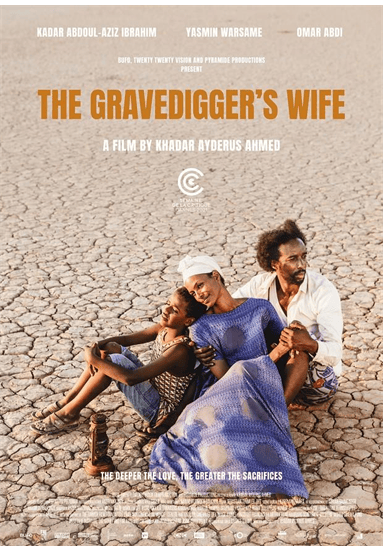
The The Gravedigger's Wife poster Source: IMDB
The negative perception of Somalia is a deeply rooted historical and cultural issue, reflecting the intertwined challenges and experiences that this African country has faced throughout history. This negative perception has been shaped by several factors, starting from colonial influences to current political and economic challenges.
Somalia is considered one of the countries that suffers from a negative image in global media. The country is often associated with conflicts, poverty, and insecurity, which has been reflected in global cinema.
Some Somali youth, in various fields, are striving to present a more balanced image of Somalia. One such individual is director Khadar Ayderus Ahmed, a Somali filmmaker and screenwriter. He is the director of the film "The Gravedigger's Wife", which was the first Somali film to be nominated for an Academy Award for Best International Feature Film in 2021.
The film was also nominated for the Grand Prix and the Golden Camera at the Cannes Film Festival and received a nomination for the Grand Prix at the Kyiv International Film Festival. It also won the Best Film Award at the African Film Academy Awards ceremony.

Director Khadar Ayderus Ahmed wins the Golden Stallion Award at the African Film and Television Festival. Source: Khadar Ahmed X Page
Khadar Ayderus Ahmed was born in the Somali capital, Mogadishu, and at the age of sixteen, he moved to Finland as a refugee with his family during the civil war.
In an interview with "On the Couch with Bossina", he mentioned that he started his career as a screenwriter who loved storytelling because he came from a background different from his new environment. However, he changed his career path to directing because he grew tired of seeing the scripts he spent so much time and effort writing being misdirected in a way that was poorly executed and inappropriate to his culture and upbringing by directors who did not share his cultural background. This led him to make the decision to direct his own films.
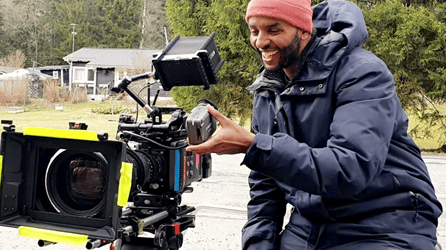
Director Khadar Ayderus Ahmed. Source: Khader Ahmed IG Page
It was his first film in the Somali language, so Khadar took a long time to convince producers to produce it in a language that was not commonly used on the big screen, as reported by BBC News Africa. Eventually, he succeeded, and the film received widespread acclaim. It opened the door for African filmmakers to break from convention and tell their stories in their native languages.
The film was also screened at the Somali National Theatre in Mogadishu, which had been inactive in recent years, and it received positive feedback and wide acceptance from an audience that was represented for the first time in a realistic and meaningful way with beautiful direction.
The film’s stars share the same background as the director; they also moved from Somalia at the onset of the civil war. Their shared roots helped them convey the message of director Khadar Ayderus Ahmed.
The actor Omar Abdi played the role of Juled. He is a Somali actor with several works, the most notable of which is the film "The Citizen", written by director Khadar Ayderus Ahmed, and won the Best Actor in a Leading Role award at the African Film Academy Awards ceremony for his performance.
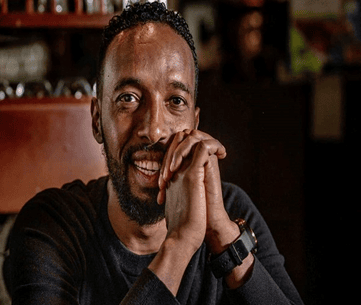
Actor Omar Abdi who plays the role of Juled in the movie, Source: The Cable Lifestile
The Somali model Yasmin Warsama, who played the role of Nasra in her cinematic debut, was born in the Somali capital, Mogadishu. She later moved with her family to Canada, where she completed her university studies and earned a bachelor's degree in psychology. Yasmin began her modeling career in Canada at the age of 20, gaining significant success due to her distinctive appearance.
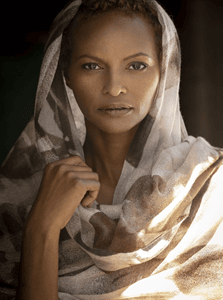
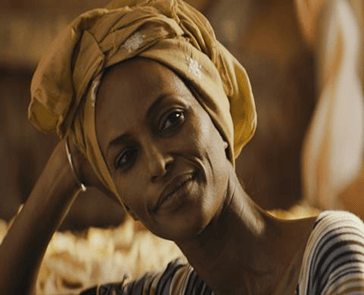
Actress Yasmine Warsame Source: Yoolia Lugovska playing the role of Nasra. Source: IMDB
The Idea of the Film
Khadar Ayderus says in his interview with "Scandinavian Films" channel during the Cannes Film Festival: "The idea came to me when one of my relatives died suddenly in Finland and the complexity of funeral and burial procedures, which can extend for weeks in Europe. At that time, my brother told me that things are much easier in Somalia, where it only takes a few hours." He continued saying that we come from a religion a culture of a society that is very reconciled with death, as they firmly believe it is a part of reality. Therefore, they see that reconciling with death reduces its awe. This made the director recall scenes and memories from his childhood in Somalia, where he would pass by a hospital and see a gravedigger nearby. These individuals confronted death daily, and it was a reality that had to be faced.

One of the scenes from the movie, Juled and Nasra performing a folk dance. Source: IMDB
The Story of the Film
In the introduction of the film, the protagonist, Juled, says, "We hunt the dead; our daily livelihood depends on the dead." Here lies the irony of the situation: it's as if he is both searching and afraid of the same thing at the same time. He reflects on the struggle of being a father to a child, unable to be a role model for him, yet despite his suffering, he still manages to sleep peacefully every night.
The story of The Gravedigger's Wife revolves around Juled, a 45-year-old Somali gravedigger who lives with his 39-year-old wife, Nasra, in a poor neighborhood in Djibouti. Nasra suffers from a chronic kidney disease, and Juled has only two weeks to save her.
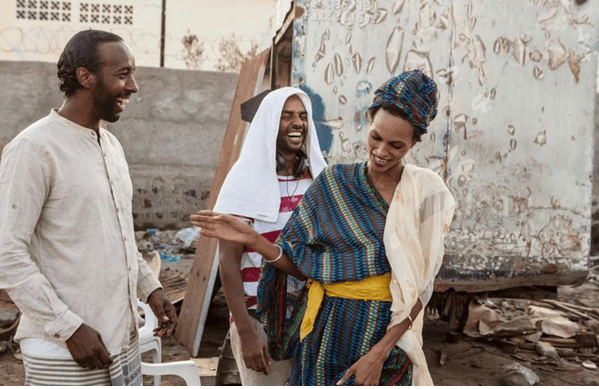
Director Khadar Ayderus and the film's stars, Juled and Nasra. Source: IMDB
Conclusion
The journey of producing the Somali international film The Gravedigger’s Wife has been an exciting and a catalyst for Somali cinema. This film not only reflects the diverse identities of the Somali people but also conveys the struggles and challenges they have faced throughout the years.
I believe that highlighting marginalized professions, such as a gravedigger, as the central focus of a cinematic story, goes beyond just the artistic aspect to a deeper level. Through these works, we can uncover real stories and shared human suffering, where we all experience life and death, regardless of our outward differences. I hope that these works encourage giving a voice to every individual, no matter their circumstances, to contribute to building a more compassionate and understanding society for all its members.
Through this artistic work, Somali filmmakers and actors have broken temporal and spatial barriers, presenting the world with a compelling story that mirrors their experiences, suffering, and hopes. In doing so, the film cements its place as the first film to bear the signature of Somali identity on the global stage, paving the way for more high-quality cinematic works from the region. This achievement represents a turning point in how the global audience perceives Somali culture. It also opens doors for new creatives from all over Somalia to explore this industry.
Recently, the Somali film scene has witnessed remarkable growth and progress, with new works like "The Village Next to Paradise" by director Mohamed Herawi, which was nominated for the Cannes Film Festival and several other international festivals. Locally, there have been developments in dramatic works, and competition between local production companies is intensifying to create content that satisfies the audience's tastes.
